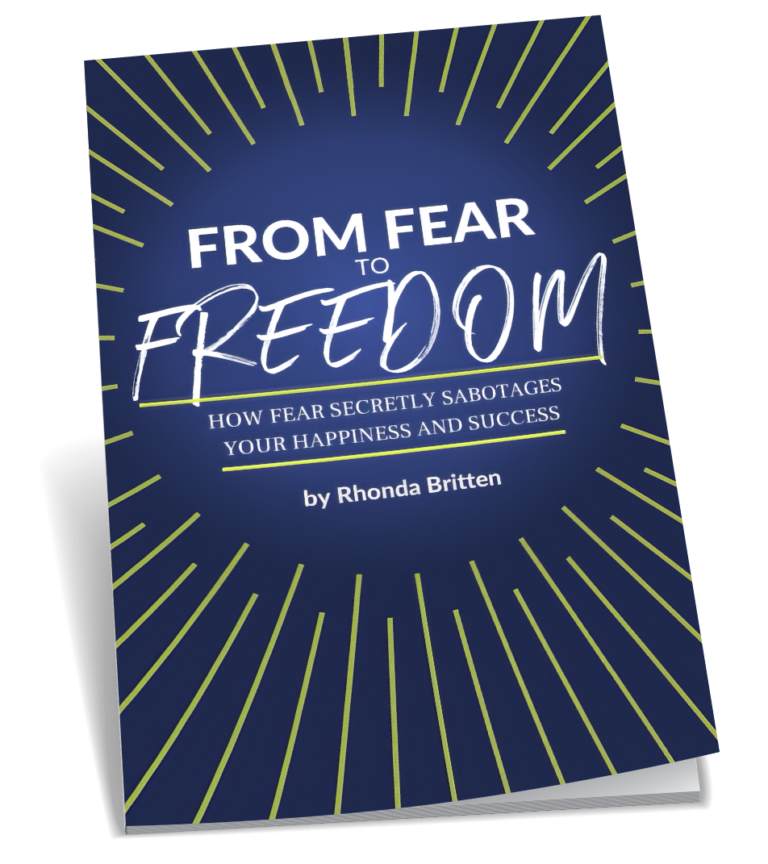Many people believe they must figure out their lives by themselves. They try hard to find their purpose, make a career change, and achieve personal goals. They struggle and get stuck in a rut. Often, it doesn’t occur to them that they could simply…hire a life coach to help them. You might ask, “What is a life coach?”
Simply put, a life coach supports others in making the desired changes in their lives. Whether they focus on professional or personal growth, coaching is a tool that can help find your own answers. A coach won’t tell you how to live your life.
This doesn’t mean you have to figure everything out on your own. A life coach can walk you through the process. In this article, I’ll explain how life coaching works and in what ways it helps people reach their full potential. I’ve seen many times with my clients that with a little nudge of support from a professional, your whole life can be transformed.
But first, let’s lay the foundation by answering one basic question in more detail.

What Is a Life Coach?
Life coaching is a young but rapidly growing industry. When I started my coaching business in 1995, almost no one knew what a life coach was. Fast forward to today, and coaching is an exploding market. A study conducted by the International Coach Federation found that from 2015 to 2019, the total number of professional coaches in the world increased by 33%.
Naturally, many people started asking themselves: What is a life coach, exactly?
A good life coach helps their clients find practical ways to live more fulfilling lives. This means that they don’t give advice or overly focus on healing the past. Inside Fearless Living’s Life Coach Certification Program, I define a life coach as someone who will stand for you until you can stand for yourself and who believes that the client sitting in front of them is already whole and complete. The job of the coach isn’t to fix them — it’s to help them uncover the best next step for their client so they can live the life their soul intended™. I live to think of it as being a witness to a soul unfolding.
How do they do that? By applying our 8 coaching skills (more about that here) as well as moving beyond limiting beliefs, asking penetrating questions, and using various fearless empowerment tools. That’s one way you can tell a coach knows what they’re doing: They focus on the personal goals of their client, rather than providing easy answers based on their own set of beliefs.
You should keep in mind that there are many types of life coaches who specialize in different things. Here are just a few examples:
- Career coaches
- Relationship coaches
- Health coaches
These life coaches help people who already know what holds them back. They work with particular areas of the client’s life — but not so much with the big picture.
A more holistic approach to life coaching helps to define the client’s goals in the first place. Then, over a few (or few dozen – the process is different for everyone!) coaching sessions, the coach helps their client to define what’s holding them back from achieving those goals while at the same time, coming up with custom, action-based solutions.
At Fearless Living Institute, we train our coaches to walk their client through a process that shifts the way they see themselves, and the world by:
- Clarifying the core fear — identifying the main type of fear that’s holding them back.
- Taking an honest look at expectations and limiting beliefs that the core fear breeds.
- Building their confidence — connecting the client to their true self and full potential.
- Creating a success plan — helping them to uncover what their next step could be.
- Envisioning a world of possibilities to give the client a taste of what it would look like if they took complete responsibility for their own life.
I believe a good coach should be able to walk their clients through all of the above steps. However, there are some common myths about how exactly they make it happen.
3 Most Common Myths About Life Coaching

Individuals and companies alike continue to hire life coaches because coaching works. But even though the industry grows and new coaching programs keep appearing, some myths around it persist.
Here are three popular misconceptions about coaching I bump into all the time. In 2021, it’s amazing how many people still don’t understand the basic ideas behind life coaching. They also confuse coaches with therapists and consultants all the time.
Myth #1: Coaching is another word for therapy
While life coaching and therapy can certainly complement one another, they’re not the same. So what’s the difference? First, therapy focuses on healing the past. Coaching focuses on the future.
Although there are exceptions, the main goal of coaching isn’t to treat mental health issues such as chronic depression. Rather, it’s to find practical ways the client can use to improve their well-being and trust their own decisions so they can move forward on their terms. These can include thought experiments, journaling, and many other specific Fearless Living techniques that raise the client’s awareness of what holds them back. Usually, it’s an emotional fear deriving from the past that they haven’t managed to face and resolve.
Once the client understands what the root cause of their struggle is, it becomes easier to come up with concrete actions to overcome the roadblocks to growth.
Some coaching exercises may also help with minor mental health issues – but this isn’t their main purpose. If a coaching client struggles with major trauma or a psychological blockage, combining life coaching with therapy may be the best solution.
Myth #2: The role of a life coach is to provide advice and “pep talk”
I don’t know how many times I’ve repeated this in my coaching career, but here it goes again: Coaches aren’t motivational speakers or consultants. They aren’t there to talk down to their clients, nor give ready-made recipes on how to move to the next level. In fact, giving advice shouldn’t be part of coaching services at all. When a coach does that, it’s as if they were saying to their client: “I know what’s good for you better than you do.”
This defies the whole purpose of coaching. Instead of empowering the client to take responsibility, it patronizes them.
The point of coaching is to support the client in finding their own answers. This can only be achieved when a coach has an appropriate set of skills and tools and the right attitude. This allows them to create conditions for trust and empowerment in the coaching relationship.
Myth #3: Life coaching is for those who can’t cope
In some circles, having a coach is considered shameful. That’s because many people think of coaching as a last resort for those who can’t deal with their own lives.
This may be one of the most harmful myths I’ve heard. Most of my coaching clients are ambitious, talented, and smart individuals who want to upgrade their lives from a B+ to an A – and beyond. They’re done with living half-heartedly. They aren’t ashamed to ask for help in their personal or professional life.
Many of my clients needed someone to support them through a life transition. Transitions are challenging by default and most people benefit from having extra support as they go from one life chapter to the next.
There’s no shame in asking for help. It’s always a better option than staying stuck in a rut and obeying your fears.
How Does Life Coaching Work?

All professional life coaching sessions have common elements. For one thing, the cornerstone of good coaching is the relationship between the client and their coach.
This relationship must be based on mutual respect and trust. But it’s also important to understand what a life coach will and won’t do for their client.
A life coach does:
- Ask questions without suggesting the answers
- Keep their client’s personal information to themselves
- Believe the client is perfectly capable of finding the best solutions
- Listen carefully to everything the client says
- See the client as innocent and fearless
- Stand for their client no matter what
- Support their right to actualize their dream and fulfill their destiny
- Provide tools and techniques for reaching specific goals.
A life coach doesn’t:
- Give advice or tell the client what they should do, think, or feel
- Talk about the client with third-parties
- Do the work for the client — the client is responsible for implementing the take-aways from the coaching session
- Lecture their client — they empower and guide them instead
- Assume what the right goals are for their client.
The above are the common elements of all life coaching methods. To meet the industry’s standard and professional ethics, a good life coach has to keep them in mind.
But there are also differences. Various training programs for coaches approach personal growth and its challenges slightly differently. While they all have their advantages, there’s one thing most of them are missing:
A holistic approach to life coaching. Here’s then the Fearless Living methodology comes into play.
How Fearless Living Is Different from Other Types of Life Coaching
When I founded The Fearless Living Institute, I wanted to create a coaching method that would apply to everyone, regardless of their personal history and circumstances. During my own journey of processing the trauma of my parents’ tragic death, I identified the cornerstone of all personal growth: self-compassion.
Without self-compassion, it’s almost impossible to overcome fear in a healthy, productive way that allows us to move forward. Whether you’re going through a divorce, experiencing a life transition, career change, or any other challenge, you need to be gentle on yourself on the deepest soul level.
This is why the Fearless Living coaching toolbox is based on compassion. This allows our coaches to help their clients overcome the single problem from which all other human problems stem. The one root cause of our suffering. A kind of “original sin,” if you will.
The only thing that stops people from moving to the next level in their lives is…fear.
That’s right. Whether you think you’re stuck in a rut because of procrastination, low self-esteem, laziness, or lack of motivation — your actual problem is fear. Once you see this, personal growth becomes easier and your shifts accelerate. It takes heart to face your fear, and someone with a clear process, like a Certified Fearless Living Coach, to take you from seeing it to mastering it. Because it can be a challenge to see your core fear because it can manifest in your life in many different ways.
This is why Fearless Living life coaching is so effective. It helps coaches and their clients address any obstacle they face at the source. It allows them to go deep, instead of fiddling with surface-level issues.
The question is…
Are You Ready To Become a Fearless Life Coach?
If you ask yourself “What is a life coach?” perhaps you’re really asking whether or not you could become one.
Could it be your full-time job to help others find fulfillment, improve their well-being, or make the desired career change?
It’s very possible. Now that you know what life coaching is and how it works, you can decide to join other professional coaches at the Fearless Living Institute.
Our methodology is simple: We support destiny-seekers to move beyond the fear that is holding them back from living the life their soul intended (and train the coaches to help them do it.) Bottom line: We teach people how to consistently choose love over fear. To achieve that, you first need to learn how fear works. We teach you to befriend it, transcend it, and make it work for you. You get to know your fears inside and out.
Then the next step is developing something few people have: authentic courage. That’s the only way you can live your life based on what your soul desires — rather than constantly avoiding what you fear.
If you’re ready to learn a holistic coaching method that helps you and your clients do that — you’re in the right place. Sign up for my signature Fearless Living Training Program. Take the first step to becoming fearless.
Many people believe they must figure out their lives by themselves. They try hard to find their purpose, make a career change, and achieve personal goals. They struggle and get stuck in a rut. Often, it doesn’t occur to them that they could simply…hire a life coach to help them. You might ask, “What is a life coach?”
Simply put, a life coach supports others in making the desired changes in their lives. Whether they focus on professional or personal growth, coaching is a tool that can help find your own answers. A coach won’t tell you how to live your life.
This doesn’t mean you have to figure everything out on your own. A life coach can walk you through the process. In this article, I’ll explain how life coaching works and in what ways it helps people reach their full potential. I’ve seen many times with my clients that with a little nudge of support from a professional, your whole life can be transformed.
But first, let’s lay the foundation by answering one basic question in more detail.

What Is a Life Coach?
Life coaching is a young but rapidly growing industry. When I started my coaching business in 1995, almost no one knew what a life coach was. Fast forward to today, and coaching is an exploding market. A study conducted by the International Coach Federation found that from 2015 to 2019, the total number of professional coaches in the world increased by 33%.
Naturally, many people started asking themselves: What is a life coach, exactly?
A good life coach helps their clients find practical ways to live more fulfilling lives. This means that they don’t give advice or overly focus on healing the past. Inside Fearless Living’s Life Coach Certification Program, I define a life coach as someone who will stand for you until you can stand for yourself and who believes that the client sitting in front of them is already whole and complete. The job of the coach isn’t to fix them — it’s to help them uncover the best next step for their client so they can live the life their soul intended™. I live to think of it as being a witness to a soul unfolding.
How do they do that? By applying our 8 coaching skills (more about that here) as well as moving beyond limiting beliefs, asking penetrating questions, and using various fearless empowerment tools. That’s one way you can tell a coach knows what they’re doing: They focus on the personal goals of their client, rather than providing easy answers based on their own set of beliefs.
You should keep in mind that there are many types of life coaches who specialize in different things. Here are just a few examples:
- Career coaches
- Relationship coaches
- Health coaches
These life coaches help people who already know what holds them back. They work with particular areas of the client’s life — but not so much with the big picture.
A more holistic approach to life coaching helps to define the client’s goals in the first place. Then, over a few (or few dozen – the process is different for everyone!) coaching sessions, the coach helps their client to define what’s holding them back from achieving those goals while at the same time, coming up with custom, action-based solutions.
At Fearless Living Institute, we train our coaches to walk their client through a process that shifts the way they see themselves, and the world by:
- Clarifying the core fear — identifying the main type of fear that’s holding them back.
- Taking an honest look at expectations and limiting beliefs that the core fear breeds.
- Building their confidence — connecting the client to their true self and full potential.
- Creating a success plan — helping them to uncover what their next step could be.
- Envisioning a world of possibilities to give the client a taste of what it would look like if they took complete responsibility for their own life.
I believe a good coach should be able to walk their clients through all of the above steps. However, there are some common myths about how exactly they make it happen.
3 Most Common Myths About Life Coaching

Individuals and companies alike continue to hire life coaches because coaching works. But even though the industry grows and new coaching programs keep appearing, some myths around it persist.
Here are three popular misconceptions about coaching I bump into all the time. In 2021, it’s amazing how many people still don’t understand the basic ideas behind life coaching. They also confuse coaches with therapists and consultants all the time.
Myth #1: Coaching is another word for therapy
While life coaching and therapy can certainly complement one another, they’re not the same. So what’s the difference? First, therapy focuses on healing the past. Coaching focuses on the future.
Although there are exceptions, the main goal of coaching isn’t to treat mental health issues such as chronic depression. Rather, it’s to find practical ways the client can use to improve their well-being and trust their own decisions so they can move forward on their terms. These can include thought experiments, journaling, and many other specific Fearless Living techniques that raise the client’s awareness of what holds them back. Usually, it’s an emotional fear deriving from the past that they haven’t managed to face and resolve.
Once the client understands what the root cause of their struggle is, it becomes easier to come up with concrete actions to overcome the roadblocks to growth.
Some coaching exercises may also help with minor mental health issues – but this isn’t their main purpose. If a coaching client struggles with major trauma or a psychological blockage, combining life coaching with therapy may be the best solution.
Myth #2: The role of a life coach is to provide advice and “pep talk”
I don’t know how many times I’ve repeated this in my coaching career, but here it goes again: Coaches aren’t motivational speakers or consultants. They aren’t there to talk down to their clients, nor give ready-made recipes on how to move to the next level. In fact, giving advice shouldn’t be part of coaching services at all. When a coach does that, it’s as if they were saying to their client: “I know what’s good for you better than you do.”
This defies the whole purpose of coaching. Instead of empowering the client to take responsibility, it patronizes them.
The point of coaching is to support the client in finding their own answers. This can only be achieved when a coach has an appropriate set of skills and tools and the right attitude. This allows them to create conditions for trust and empowerment in the coaching relationship.
Myth #3: Life coaching is for those who can’t cope
In some circles, having a coach is considered shameful. That’s because many people think of coaching as a last resort for those who can’t deal with their own lives.
This may be one of the most harmful myths I’ve heard. Most of my coaching clients are ambitious, talented, and smart individuals who want to upgrade their lives from a B+ to an A – and beyond. They’re done with living half-heartedly. They aren’t ashamed to ask for help in their personal or professional life.
Many of my clients needed someone to support them through a life transition. Transitions are challenging by default and most people benefit from having extra support as they go from one life chapter to the next.
There’s no shame in asking for help. It’s always a better option than staying stuck in a rut and obeying your fears.
How Does Life Coaching Work?

All professional life coaching sessions have common elements. For one thing, the cornerstone of good coaching is the relationship between the client and their coach.
This relationship must be based on mutual respect and trust. But it’s also important to understand what a life coach will and won’t do for their client.
A life coach does:
- Ask questions without suggesting the answers
- Keep their client’s personal information to themselves
- Believe the client is perfectly capable of finding the best solutions
- Listen carefully to everything the client says
- See the client as innocent and fearless
- Stand for their client no matter what
- Support their right to actualize their dream and fulfill their destiny
- Provide tools and techniques for reaching specific goals.
A life coach doesn’t:
- Give advice or tell the client what they should do, think, or feel
- Talk about the client with third-parties
- Do the work for the client — the client is responsible for implementing the take-aways from the coaching session
- Lecture their client — they empower and guide them instead
- Assume what the right goals are for their client.
The above are the common elements of all life coaching methods. To meet the industry’s standard and professional ethics, a good life coach has to keep them in mind.
But there are also differences. Various training programs for coaches approach personal growth and its challenges slightly differently. While they all have their advantages, there’s one thing most of them are missing:
A holistic approach to life coaching. Here’s then the Fearless Living methodology comes into play.
How Fearless Living Is Different from Other Types of Life Coaching
When I founded The Fearless Living Institute, I wanted to create a coaching method that would apply to everyone, regardless of their personal history and circumstances. During my own journey of processing the trauma of my parents’ tragic death, I identified the cornerstone of all personal growth: self-compassion.
Without self-compassion, it’s almost impossible to overcome fear in a healthy, productive way that allows us to move forward. Whether you’re going through a divorce, experiencing a life transition, career change, or any other challenge, you need to be gentle on yourself on the deepest soul level.
This is why the Fearless Living coaching toolbox is based on compassion. This allows our coaches to help their clients overcome the single problem from which all other human problems stem. The one root cause of our suffering. A kind of “original sin,” if you will.
The only thing that stops people from moving to the next level in their lives is…fear.
That’s right. Whether you think you’re stuck in a rut because of procrastination, low self-esteem, laziness, or lack of motivation — your actual problem is fear. Once you see this, personal growth becomes easier and your shifts accelerate. It takes heart to face your fear, and someone with a clear process, like a Certified Fearless Living Coach, to take you from seeing it to mastering it. Because it can be a challenge to see your core fear because it can manifest in your life in many different ways.
This is why Fearless Living life coaching is so effective. It helps coaches and their clients address any obstacle they face at the source. It allows them to go deep, instead of fiddling with surface-level issues.
The question is…
Are You Ready To Become a Fearless Life Coach?
If you ask yourself “What is a life coach?” perhaps you’re really asking whether or not you could become one.
Could it be your full-time job to help others find fulfillment, improve their well-being, or make the desired career change?
It’s very possible. Now that you know what life coaching is and how it works, you can decide to join other professional coaches at the Fearless Living Institute.
Our methodology is simple: We support destiny-seekers to move beyond the fear that is holding them back from living the life their soul intended (and train the coaches to help them do it.) Bottom line: We teach people how to consistently choose love over fear. To achieve that, you first need to learn how fear works. We teach you to befriend it, transcend it, and make it work for you. You get to know your fears inside and out.
Then the next step is developing something few people have: authentic courage. That’s the only way you can live your life based on what your soul desires — rather than constantly avoiding what you fear.
If you’re ready to learn a holistic coaching method that helps you and your clients do that — you’re in the right place. Sign up for my signature Fearless Living Training Program. Take the first step to becoming fearless.







